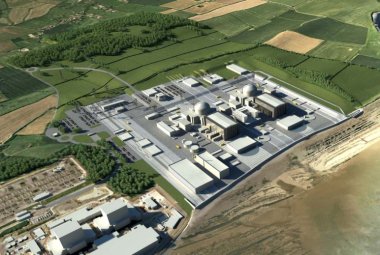Go-ahead for UK nuclear groundwork
29 July 2011
A round of applications, permissions and orders has launched the UK's first new nuclear build project into a practical phase.
EDF Energy gained permission last night from local authorities in West Somerset to begin preparing the Hinkley Point C site for construction. Shortly afterwards it ordered the heavy steam supply components from its reactor supplier Areva and submitted a formal application for the Nuclear Site Licence it will need to own and operate the eventual nuclear power plant.
The developments came just ten days after the UK parliament debated and approved the National Policy Statements for Energy Infrastructure, which formally designated Hinkley Point and seven other sites as suitable for new reactors. This was delayed somewhat to take account of comments from head nuclear safety regulator Mike Weightman, who had been asked to independently consider the causes of the Fukushima accident. In mid-May his interim report said there was no need to reconsider siting strategy.
EDF Energy can now fence off and excavate the site, which lies alongside two other nuclear power plants. Hinkley Point A has two reactors from the 1960s that are now closed; Hinkley Point B has two from the 1970s that are set to operate until 2016. Plans are for two Areva EPRs to be built there, with the first one operating from 2018.
 |
| How Hinkley Point C should look |
The work soon to begin should create "up to 500 jobs, the majority of which will be for local people in Somerset," said EDF Energy. About £25 million ($40 million) will be spent to minimise disruption from construction work, said the company, putting a figure of £100 million ($162 million) on its annual contribution to the local economy. The chief executive of the Somerset Chamber of Commerce, Rupert Cox, said: "Young people looking for careers in Somerset need to be enthused by the potential of skilled jobs in high level civil construction and engineering, as well as a 60-year legacy of up to 900 high-skilled nuclear power workers."
However, the local permission EDF Energy holds relates only to site preparation. Several regulatory hurdles remain before nuclear construction can begin: Generic Design Approval for the Areva EPR power unit; approval from the Environment Agency for routine radiological releases, operation of diesel generators and use of cooling water; issuance of a Nuclear Site Licence from the Office of Nuclear Regulation (ONR); and then actual planning permission, known as a Development Consent Order.
An application for the Nuclear Site Licence was put in today. The ONR said it would take about 18 months to consider whether the project company set up by EDF Energy, NNB Generation Company, has the "suitability, capability and competence to install, operate and decommission a nuclear facility." The full text of the site license application is available to the public, in what EDF Energy said was a first for the UK nuclear industry.
After reviewing "the adequacy of the licensee's arrangements and their implementation" there comes "a continuing, robust, permissioning process that a licensee has to go through in order to install, operate and decommission a nuclear power plant," said ONR deputy chief inspector Colin Patchett.
Researched and written
by World Nuclear News